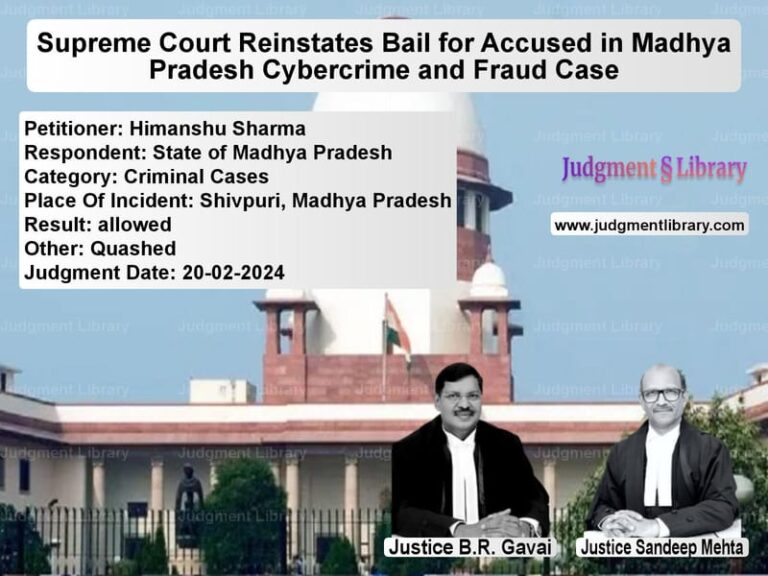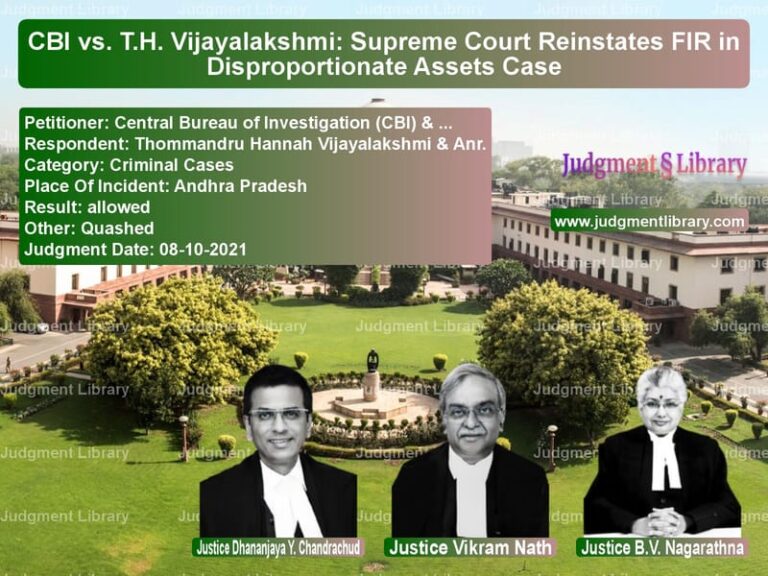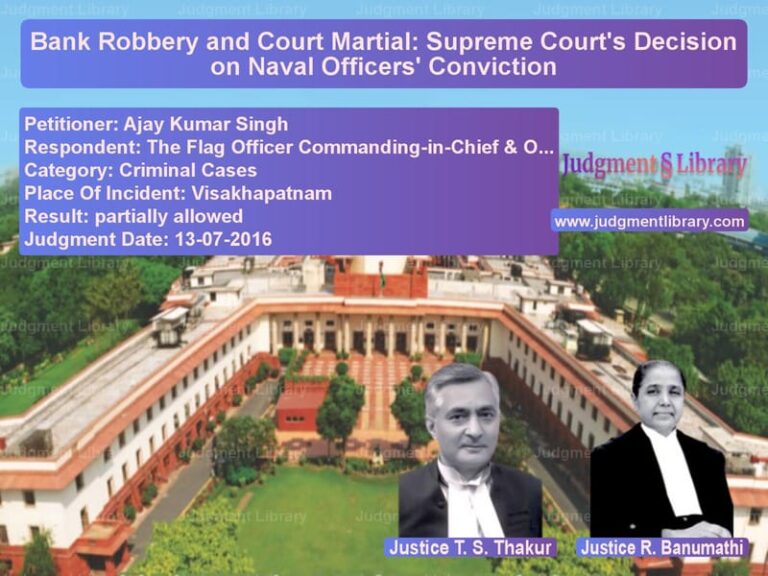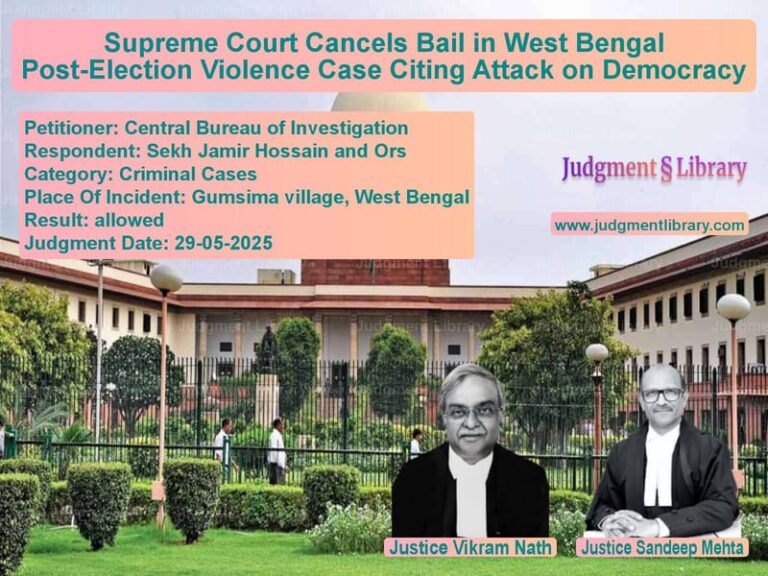Supreme Court Quashes High Court Order on Deputy Collector Appointment in UP
The Supreme Court of India, in its judgment dated 23 November 2021, quashed an order by the Allahabad High Court that had directed the appointment of Chunni Lal to the post of Deputy Collector. The case, State of U.P. vs. Chunni Lal & Ors., revolved around a dispute regarding selection for the Uttar Pradesh Combined State Service Examination of 1985, which led to conflicting claims over appointment rights.
Background of the Case
The controversy began when the Uttar Pradesh Public Service Commission (UPPSC) initiated a selection process for 35 Deputy Collector posts through the 1985 Combined State Service Examination. Two selected candidates, Shri Ram Subhag Singh and Shri Ramesh Kumar Yadav, did not join their assigned posts. Consequently, UPPSC recommended two other candidates, Shri Digvijay Singh and Chunni Lal, for appointment.
However, another candidate, Ajay Shankar Pandey, challenged the process by filing Writ Petition No. 22966 of 1988 before the Allahabad High Court. On 9 May 1989, the High Court ruled in favor of Pandey, directing UPPSC to recommend his name instead of Chunni Lal’s. Following this decision, the Commission withdrew Chunni Lal’s recommendation.
Chunni Lal subsequently challenged this action, arguing that his removal from the list was arbitrary. The Allahabad High Court, in an order dated 16 July 2014, set aside the state’s rejection of Chunni Lal’s claim and directed his appointment. The State of U.P. then appealed to the Supreme Court.
Arguments by the State of U.P.
The State of Uttar Pradesh, represented by its legal counsel, contended:
- Once the High Court had directed UPPSC to recommend Ajay Shankar Pandey, there was no scope for appointing another candidate to the same post.
- The state had considered Chunni Lal’s representation but found no legal justification for his appointment.
- The High Court’s decision to appoint Chunni Lal without affecting Pandey’s position was unsustainable, as two persons could not be appointed to a single post.
- The High Court’s interference in the selection process disrupted the proper functioning of the recruitment procedure.
Arguments by Chunni Lal
Chunni Lal’s legal representatives argued:
- The UPPSC had lawfully recommended him, and his removal was unjustified.
- The withdrawal of his recommendation was arbitrary and violated principles of natural justice.
- There were vacant posts in the cadre, and he should have been accommodated.
- The High Court had correctly recognized his rights and ordered his appointment without affecting Pandey.
Supreme Court’s Observations
The Supreme Court bench, comprising M.R. Shah and B.V. Nagarathna, examined the case and noted:
- The High Court’s order was flawed as it directed the state to appoint Chunni Lal despite the fact that the post was already filled.
- Two individuals could not be appointed to the same post.
- The High Court failed to consider that Chunni Lal’s representation was rejected due to the appointment of Ajay Shankar Pandey.
- The decision disrupted the recruitment framework by creating unnecessary litigation.
Key Supreme Court Rulings Cited
The Court referred to several landmark judgments:
- Shankarsan Dash v. Union of India (1991) – Holding that a candidate’s selection does not guarantee appointment unless there is a vacancy.
- Union of India v. G. Ramakrishnan (2005) – Reinforcing that courts should not interfere in recruitment processes unless there is a clear violation of law.
- Ajit Singh v. State of Punjab (1999) – Emphasizing that public employment must be governed by established rules and cannot be subject to judicial directives.
Final Judgment
The Supreme Court ruled in favor of the State of U.P., issuing the following directives:
- The Allahabad High Court’s judgment dated 16 July 2014 was set aside.
- The rejection of Chunni Lal’s representation by the State of U.P. was upheld.
- Chunni Lal had since retired as Deputy Transport Commissioner, making the High Court’s order redundant.
- There would be no appointment of Chunni Lal as Deputy Collector.
Implications of the Judgment
This ruling has significant implications for public service recruitment in India:
- Judicial Interference in Recruitment: The ruling clarifies that courts cannot mandate appointments without legal vacancies.
- Finality of Selection Processes: The decision reinforces that appointments must adhere to prescribed procedures.
- Administrative Efficiency: The ruling prevents disruptions in recruitment frameworks by limiting judicial overreach.
- Precedent for Future Service Disputes: The case establishes that once a post is filled, no further judicial intervention can create an additional appointment.
The Supreme Court’s judgment in State of U.P. vs. Chunni Lal upholds the integrity of public service recruitment, ensuring that employment decisions remain within legal frameworks.
Petitioner Name: State of U.P..Respondent Name: Chunni Lal & Ors..Judgment By: Justice M.R. Shah, Justice B.V. Nagarathna.Place Of Incident: Uttar Pradesh.Judgment Date: 23-11-2021.
Don’t miss out on the full details! Download the complete judgment in PDF format below and gain valuable insights instantly!
Download Judgment: state-of-u.p.-vs-chunni-lal-&-ors.-supreme-court-of-india-judgment-dated-23-11-2021.pdf
Directly Download Judgment: Directly download this Judgment
See all petitions in Recruitment Policies
See all petitions in Public Sector Employees
See all petitions in Employment Disputes
See all petitions in Judgment by Mukeshkumar Rasikbhai Shah
See all petitions in Judgment by B.V. Nagarathna
See all petitions in allowed
See all petitions in Quashed
See all petitions in supreme court of India judgments November 2021
See all petitions in 2021 judgments
See all posts in Service Matters Category
See all allowed petitions in Service Matters Category
See all Dismissed petitions in Service Matters Category
See all partially allowed petitions in Service Matters Category







